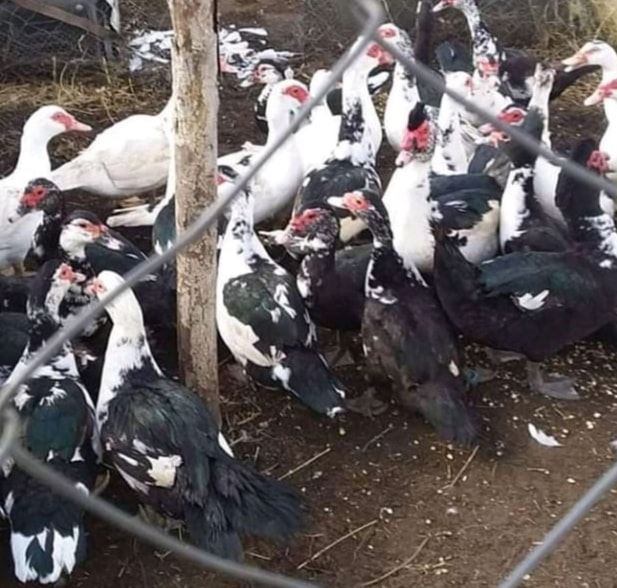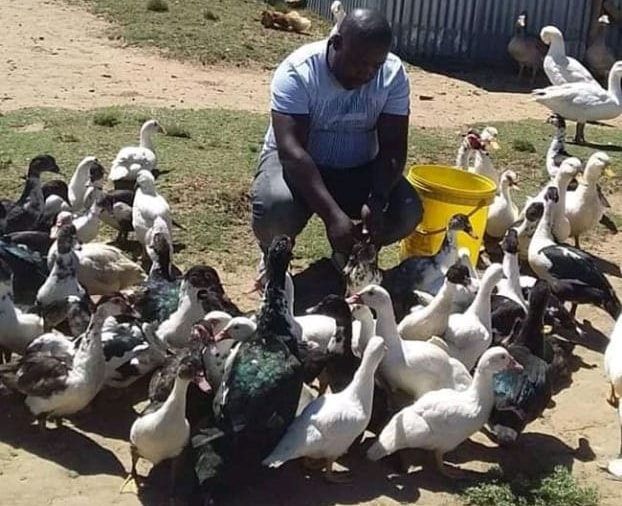Over the past few years, he has grown and sold well over a thousand ducks (Makau)—which is a very rare thing in this country. He is also dealing with geese (Likhantši) and hopes to increase their quantities. That is Mr Thabiso Matšoele, the former student of the National University of Lesotho (NUL) who can be best described as an agric enthusiast.
“I’ve always wanted to create a path for young up-and-coming farmers to follow,” he said.
“Ducks are amazing to grow,” Matšoele added. They are scarce as gold in Lesotho, but they have numerous advantages including a high hatching rate, a need for little to no medication (they hardly get sick), high rate of survival, and little investment in their growth if they are grown right.
Since Basotho rarely grow ducks, especially for commercial purposes, this story is dedicated to explaining why Matšoele find ducks fascinating and why ducks may be better than chicken for business. We are also going to share some few “annoying” things about ducks which will make you love them even more.
But first, this… “when I see a bird that walks like a duck and swims like a duck and quacks like a duck, I call that bird a duck.” This is a statement, famously uttered by an Indiana poet, James Whitcomb Riley (1849–1916).
He was right.
Here are the things that set ducks apart in Lesotho and that set them apart anywhere in the word.
In Lesotho, ducks are scarce as gold. For whatever reason, Basotho don’t grow ducks in droves, especially for business, and, “it is one of the reasons I went for them, I wanted to test a different market in agriculture,” he said.
What Basotho may not know is that they are missing out. Ask the local Chinese brothers (who love ducks like no other) and they will tell you that ducks do not only make for extremely tasty dishes (you still have to be a good cook though), they are also known to make for a healthy meat, “some of the many people who trouble me with high demands for ducks are those who are health conscious,” Matšoele said.
It is not by chance.
Duck meat has a high concentrations of proteins, Vitamin C, B vitamins and many nutrients, including iron and selenium. By eating duck meat, you will boost your immune system, support your thyroid health, protect your bones and reduce a heart risk.
One good thing about ducks is that they have a very good hatch rate (a qhotsa hantle). Those who grow chicken know very well about a problem of eggs not hatching (bothata ba liruoa). “With ducks, that is not much of a problem. Many times you get all the incubated eggs hatching after 35 days of incubation.”
Another plus with ducks is that they are very meaty. With one duck, you will eat to your good satisfaction (u tla tea ka e tšehla mpa).
People who trade in birds also know that death of some chickens before their maturity can be a problem. Not ducks. They generally wait to die the day you slaughter them. “My experience is that they have a high survival rate and, interestingly, they rarely get sick, if they ever do. I don’t recall providing medication for them.”
There are many other benefits too. They eat a lot like pigs, they are not too specific (ha re tsebe se neng se nontše fariki). They even eat weeds “so we don’t remove weeds out of our yards.”
More important for a businessman like him, they make him a plenty of income. One mature duck can cash for M100 if she is a female. A male is even pricier and can cash for a whopping M250 each!
However, like anything else in this world, ducks do not always make for a rosy picture.
“They can be very naughty “makau a ea seba,”” and “keeping things clean is not one of their strong points.” Since his are free roaming ducks, they create less mess. But if you keep them in coops (lirobe), as some people do, then they will thank you by messing things up.
One more thing, they like water.
“I have a dam and if I put them there, they forget everything and spend the whole day swimming.” Of course we bear with them. Who ain’t no lik’n a good swim? So he made a plan. Instead of a dam, he put water in smaller containers and let them swim in there. They don’t spend much time in the containers.
One more problem. Whitcomb said, “…walks like a duck and swims like a duck and quacks like a duck…” Obviously, he forgot “flies like a duck.” Yep! Those things can fly O! “Especially if you let them go thirsty, they have a way of sensing water bodies in some distance. And they will fly there.”
Here is the thing.
“You have to keep clipping their wings once in a while so they don’t fly and leave you,” he said.
And “that makes for a hard work in the farm.”






